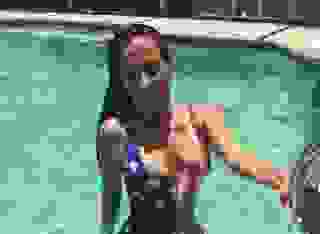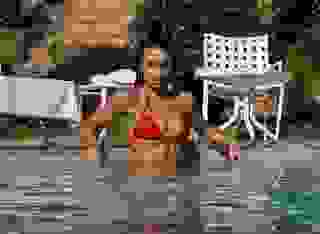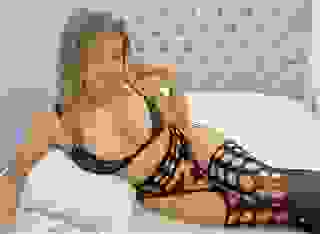Note: You can change font size, font face, and turn on dark mode by clicking the "A" icon tab in the Story Info Box.
You can temporarily switch back to a Classic Literotica® experience during our ongoing public Beta testing. Please consider leaving feedback on issues you experience or suggest improvements.
Click hereBethanie thought back to her Aunt Sophia's lessons: "The best thing is blessed silver. Other holy objects work: icons of saints, sacred relics, that kind of thing. Sometimes just enough trauma will do it: cut the head off or blow it up. But now and then they come back even from that. Silver is the only thing that works every time, as long as it's blessed."
"That's true," said Fontenoy. "But here is one other way: If the werewolf really wants to die, he can kill himself. Almost anything works then. Even aconite."
He tried to set his glass down but he dropped it instead. Bethanie pulled her feet up, as if the spillage itself was deadly. "I'd been saving it for after Madeline is dead, but I'm not strong enough. You'll take care of everything now, won't you? I know you hate me, but you'll do this because it's your duty. Right?"
His eyes were red, pained, bleary with tears. She wondered what her own looked like. He seemed to drift into a fitful sleep then. After 20 minutes his breathing became pained. After 30 minutes he started to twitch and writhe. After 45 minutes he became sluggish, and his breathing was so shallow that Bethanie could not have heard it if not for the utter, icy desolation of the apartment. After an hour he stopped breathing entirely and slumped over, twisted, sweat-drenched, and pale. The entire time Bethanie sat and watched, biting her thumb. Now she approached the corpse, daring to put her hands on the clammy flesh and feel for a pulse. There were steps she should take to ensure permanent death, but she wasn't sure if she had the time or--
Fontenoy grabbed her wrist. She tried to pull back but his fingers were locked on. His eyes fluttered open, and they were the pale amber eyes of a wolf. When his mouth opened she saw canine teeth flecked with spittle. The entire corpse jerked to its feet like a marionette and grabbed at her neck. She knew--from the vacant look in his pupils and the stiff awkwardness of his limbs--that Fontenoy was already dead, but the wolf in him was still in its final throws, lashing out at anything around it. If he died with his hands around her throat he would never release, she knew, so with some effort she grabbed the knife again and, with one shuddering blow, sank it into the soft flesh under his jaw. Blood flowed and his yellow eyes rolled back in his skull. The fingers on her neck loosened. He fell with a vile thump, letting out one final sigh that sounded very much like a whimper.
Bethanie stood panting over him. She dropped the knife and wiped sticky blood onto her pants. Numb, she stripped off her bloody clothes and left them there, fumbling her way to the apartment's tiny shower. The cold, warlike part of her brain should have been telling her that staying was too risky, that if anyone came in and found her in the apartment with the dead man she'd be in a cell so fast the water would not yet have evaporated from her skin. But she hadn't slept in nearly two days and, by her own count, had almost died three times in that span. A malaise of shock and exhaustion made it impossible to care about anything.
She scrubbed herself as best she could (she hadn't bathed in a while--running water worked only sporadically these days). The voice in her head wouldn't let her go so far as to sleep in the apartment's only bed, so she bunked down in a closet filled with the sour smell of mothballs. While she slept, she dreamed (something else she had not done in some time), and in her dreams she remembered the first time she'd ever seen a German, at the old family house in Brittany. The Germans had taken over the house next door as their command post, and Aunt Sophia had feared they'd take this one too, but they didn't. They shared a common well, and the soldiers in their green uniforms waited for Aunt Sophia to draw her water every morning before helping themselves. They were always polite, but she came in angry every day anyway. She warned Bethanie to keep out of sight of them.
But one day someone knocked at the door and she, without thinking, answered it. There a man stood, starch-straight. He showed so many teeth when he smiled that Bethanie thought about the voice her Aunt Sophia used for the wolf in the fairy tales: "Little pig, little pig, let me in..."
In careful and precise French he said: "Would you allow me to pick some flowers?" Bethanie blinked. Was he making fun of her? Apparently not. He added, by way of explanation: "For the captain's birthday."
Bethanie consented, just to get the stranger off her porch. Later, Aunt Sophia beat her for it. Sometimes she imagined she could still feel the bruises.
She also dreamt about Paul. She'd been allowed to visit him once in the POW camp at Laval, not long after the surrender. She wore the only good dress she had left, and she went alone. (Aunt Sophia couldn't stand seeing Paul a prisoner. "It's humiliating," she said, though it was not clear for which of them she meant.) Paul looked thin and tired. To Bethanie, there had always been something mighty and grand about Paul. When he'd trained for cross-country she'd stood on the fence and counted his laps, watching him run and run, like a machine that would never wind down. As her big brother, he was of course invincible. Seeing him now, he looked almost timid. The war had not diminished Paul, but it had entirely outclassed him.
The general word was they would all be sent home soon. "We suffer more from the idea of being prisoners than from the prison itself," he said. Bethanie didn't understand this either, but nodded.
They were allowed to talk for half an hour, at the end of which, very gently, she hinted that perhaps it was time for him to attempt an escape. Paul said simply that he couldn't. "I gave them my word as a soldier," he said, and it was clear that to him that was the end of it. Bethanie had the idea that at least once he'd been allowed to leave the camp to attend something and after that he would have viewed going back on his word as a betrayal of the highest order.
"It doesn't matter," he told her. "We'll all be home soon. What do the Germans need with a million prisoners? What would they even do with all of us?"
He sent her home with a hug a promise that she should look after the household until he returned. "You're a Chastel," he told her. And she knew that meant, "Be brave."
She wrote to him every week, but in September all of the letters came back in a bundle, unopened and stamped "undeliverable." Later, the newspapers confirmed it: All of the prisoners at Laval had been sent to Germany. Some of them went to mines or factories. Others went to the camps. Bethany held out hope: When he realized that the Germans wouldn't keep their word, surely he'd try to escape after all. But they never heard tell of him. He was just gone.
"I gave them my word as a soldier," he'd said, and they gave theirs back. And then they broke it. And Bethanie would never forgive them.
She woke unsure where she was. Then the smell reminded her: the apartment stank of death. She had to get out. Her clothes were ruined, so she went to the closet, finding some of Fontenoy's that suited her. Women in Paris had started wearing slacks just after the occupation, a quiet rejoinder to Vichy propaganda about the importance of motherly, feminine women who would raise a new generation of good little fascist children. Nothing quite fit her, but with the shortages that wasn't unusual either. She emptied her old pockets of money, fake ID, and ration cards, then hesitated only a moment before pawing through Fontenoy's drawers and liberating a few extra francs he'd never need again.
The corpse was still there. She'd been half afraid (and not without good reason) that it might not have stayed dead. She inched around it. It was almost night again, and with a shudder she remembered what Fontenoy had told her: Madeline was out there somewhere.
Bethanie had been gone at least 24 hours and Velin would surely assume she was dead--or, worse, arrested. She walked too fast, and her shoes went click-clack, click-clack on the stones of the old streets. Get there, report in, and then figure out what to do about the werewolf later, that was the plan. She didn't have the capacity for anything more specific yet.
She felt trouble before she actually saw it. A knot of people blocked the avenue ahead, and a single Gray Mouse (what they called the women volunteers of the Wuhrmacht) was testily trying to disperse them. From their recalcitrance, Bethanie knew there must be blood on the street. Her feet wavered to change direction; but no, that would look suspicious. Instead she sped up, half-running, like any flighty Parisian girl hoping to gawk at the aftermath of whatever had happened before the Germans shooed everyone away. Maybe the wolf had killed again. Or maybe...this was only a few blocks from the laundry and print shop. There was no particular reason to think something had happened to Velin and the others. No reason to feel so afraid.
And yet, as she approached the intersection she felt she already knew what she's see there.
Bethanie shoved through the mob, letting her sharp knees and elbows clear a path. The Gray Mouse snapped at her but Bethanie ignored it. Up ahead, someone moaned in pain. "Why did you run?" said a voice with a German accent. He almost sounded sad. "It wasn't worth it."
Bethanie couldn't see what was happening. She wanted to push everyone down and run in, but she didn't. The Gray Mouse grew angrier and looked about to put hands on Bethanie when someone grabbed her arm from behind and jerked her back. She was getting ready to turn and hit her attacker when she recognized his voice:
"They're looking for you. Come with me."
Fabien.
As they walked arm-in-arm, trying their best to look like a couple out for a pre-curfew walk, he told her everything that had happened: An hour ago someone had stuck the barrel of a gun through the ventilation ducts and shouted, "You're surrounded!" A raid, like they'd always feared. It was chaos then: There was no way out. Velin killed himself on the spot. Max tried to run and they shot him, blood stains sprinkled like red stars on his printer's apron. Everyone was herded out into the streets.
They grabbed Dulac and asked if there was anyone else, but he wouldn't answer. They beat him until he could barely stand, but he still said nothing. In the end he refused to turn around when they ordered him, forcing them to look him in the eye when they shot him. A few of them made a break for it then; it was Lucienne whose cries Bethanie heard at the intersection a moment ago. She almost made it, but they'd shot her legs out from under her. Only Fabien managed to slip away. It was luck he'd spotted Bethanie and impulse that he stopped to retrieve her rather than finish his getaway. She knew she should admonish him for taking the risk, but in the moment she was simply grateful.
He took her to a flat, a rat-infested hole that had once been a storage closet by the looks of it. Locking the door he said, "We have an hour here, maybe two at most. When we leave, it must look like no one was ever here."
The old springs of the thin cot groaned when she sat. Fabien kept by the door, looking at her strangely. It was a moment before she realized why. "I wasn't there," she said.
"We thought they'd gotten to you."
"And you assumed I'd given you all up."
"Most didn't. Velin in particular."
Her heart hurt a little at the sound of his name. Was he really dead? Were they all?
"Tomas wasn't there either," Fabien said. "I don't know what's happened to him. But he's the one man even I wouldn't suspect."
"It wasn't me. But you must know that already, or you wouldn't have taken me with you."
"Yes."
"What changed your mind?"
He said nothing, but gave her a particular look. Inwardly, she sighed. So even he wasn't immune to such things. Well, he was a man, after all.
"That's very dangerous," she said. "And we both know nothing can come of it."
"In an hour, nothing will. Where I go next, you can't follow."
She understood. She would have to find a safe house of her own, and that would be the last they'd ever see of each other. He'd go back to his own kind, she to hers (or most likely to her death), and the war would take care of one or both of them sooner or later. He'd already taken all the risks for her he ever would, and she'd have no opportunity to have to decide whether to return the favor. It was better this way. Still, just one hour, and after that she'd really alone in the world...
Hell with it, she thought, and kissed him, then let him push her down onto the cot. No time for any more talk; not much time even to kiss. Just enough time to forget everything else that had happened, at least for a moment. She let him be on top this time; it suited his vanity. When she told him before it was not her first time she'd told the truth, but he still unused to it, and the other men had hurt her (without meaning to). This time she didn't care if it hurt, which made it all the more a relief when the feeling came and instead it was one of deep, aching satisfaction.
If she'd moaned or cried out it would have echoed in the tiny space, so to keep quiet she bit down on his shoulder. Her hair, damp with sweat, clung to her. Fabien's muscular body stretched and strained and she bowed underneath him, making her frame a kind of cradle, arms flung around his neck and legs wrapped tight around his waist. Every time his face lowered a little she darted up to kiss him; his lips were almost cool as hers touched them. Her tongue slipped between them and for a second they held on to each other in a long, deep kiss that threatened to untie a knot in her chest she'd walked around with all of her life, or at least all of her life that she remembered and that mattered.
She broke off and entwined him even more firmly against herself, encouraging him to go as hard and as fast as they could. His admonishment that they could leave no trace would be spoiled if they broke the cot, but so many other things were broken already that this seemed unimportant. When she came she thought she saw stars in the dark. She was afraid one of them might look like the full moon, sacred to the demon wolves, but they remained stars until fading from view, and that was a comfort.
And that was it. They stayed in each other's arms as long as they dared, and when it was time to go they both knew it. He was undoubtedly off to make contact with some Communist circuit or another, most likely not even in the city. And where was she going? Like an idiot, she had not given it a thought. But naturally there could be only one place: to the Jesuit. If anyone had escaped the roundup it would be him, and he was the only person she could rely on not to turn her away. Besides, she had a sense that he should know about Fontenoy's confession.
Fabien left before her, so they wouldn't be spotted together. No time for goodbyes. He paused long enough--half a second, maybe less--to give her a single look, and that was as much of a gesture as either could afford. The room seemed colder once the door closed behind him. She could just lie down here and wait to be discovered. It would be easier. Instead she put her boots back on. She could make it to the church before curfew fell. What would happen then she couldn't imagine, but at least she had a mission now: Get there. It was always easier with a mission in mind.
A light was still on when she arrived, but the church door was slightly ajar. Bethanie wavered at the threshold. Once inside, she saw that precious candles were lit but being wasted on an empty nave. She wanted to call out but her better instincts stopped her. She heard the faint creaking of a hinge. It wasn't the door behind her and it wasn't the rectory door, which meant it came from the confessional.
She slid off her shoes and padded over to it. The floor was cold on her bare feet. She put her ear to the wall but heard nothing. The other compartment was open, so she stuck her head inside, trying to get close to the screen without creating a shadow on it. She held her breath; cold droplets of perspiration crept down her face...
And then a voice said:
"Chastel."
Wood splintered and the booth split apart. Bethanie fell and scrambled away, fingertips struggling for purchase on the smooth floor. Madeline Fontenoy stepped out. She was angular and pale, like the prisoners who escaped the camps. Her features protruded, as if her skull was not entirely the right shape, and her hands seemed to be misshapen too: too long, too rough. She snaked her head from side to side and breathed deep, nostrils twitching. "I know your scent, Chastel. It makes me hungry. God I'm hungry."
Bethanie slipped on a broken board. Her hands groped for her gun but she remembered she didn't have it. There was no weapon around except splintered timber too flimsy to matter.
Madeline's lips drew back over her teeth. "Madeline!" Bethanie said, and the sound of her name seemed to stop the other woman for a second. Bethanie stood. "You don't have to do this. I talked to Jean. He wanted me to help you."
A pause. "Is he all right?"
"He's...he didn't make it."
Madeline screamed, and then she began to change. Bethanie had heard the stories but never actually seen it happen: the body splitting apart as something too big to have ever fit inside it unfolded, the limbs twisting into new forms and the face stretching with the painful crack of bones and flesh turned to shapes they were never meant to have. She looked away. She knew that the sick, helpless feeling that was coming over her would probably paralyze her in a second, like it did for almost everyone.
The only plan she could think of was, perhaps, to use the wolf's size against it by finding some place it couldn't fit into. The rectory? There may be a window. It was a pitiful chance, but she was out of time. She heard the heavy thump of a too-large body dropping to all fours. She had to go now.
Bethanie managed only a few steps before she tripped again and stumbled against the altar. That's it, she thought, that's the mistake that kills me. She'd lost a precious second, and the wolf was already too close. She felt shock, anger, disappointment, and finally resignation. She thought about Dulac forcing the Germans to look him in the eye while they shot him. She'd do the same, and then all of her obligations would be discharged.
Something caught her eye as she turned, a crazed web of light on the floor: The ground was strewn with shards of colored glass. She had spilled the box with the remains of the broken window. The biggest piece was almost six inches long. Without thinking, she reached for it. The sharp edges of the glass felt somehow reassuring as she wrapped her fingers around them.
The werewolf was a dark shape in front of her, lean and mangy, but its head and paws huge. She was a ragamuffin girl, alone in the world, thin from hunger and wearing stolen clothes, with no armor and no real weapon. But at least she was a Chastel. Closing her eyes, she charged and waited for the inevitable death.
It didn't come.
For a second the world turned to crystal, hanging still and suspended all around her. Then she felt a warm dribble of blood on her wrist and smelled the reeking breath of the werewolf as it groaned right into her face. Confused, she opened her eyes. The beast lay crumpled at her feet, eyes rolled back in its skull, mouth twisted in the shape of its last bloodthirsty snarl. Somehow, it was dead. It was a moment before she saw that the stained glass shard stuck in the monster's breast.
She had run straight at it with the sharpest end pointed for its heart, but by rights it should have broken against the monster's ribs. Instead it had slid in as easily as a blade into its own sheath. Bethanie herself was unharmed. It was insane. It was a miracle. It made no sense at all. Then she remembered what the Jesuit had said:








